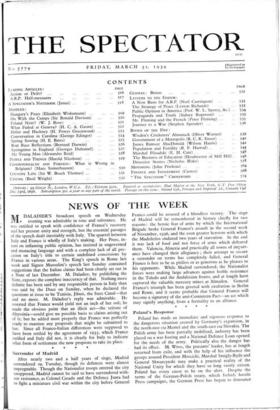Surrender of Madrid After nearly two and a half years
of siege, Madrid surrendered on Tuesday, though its defences were almost impregnable. Though the Nationalist troops entered the city unopposed, Madrid cannot be said to have surrendered with- out resistance, as Colonel Casado and the Defence Junta had to fight a miniature civil war within the city before General Franco could be assured of a bloodless victory. The siege of Madrid will be remembered in history chiefly for two reasons : the heroic feat of arms by which the International Brigade broke General Franco's assault in the second week of November, 1936, and the even greater heroism with which the Madrilefios endured two years of starvation. In the end it was lack of food and not force of arms which defeated them. Valencia, Almeria and practically all towns of import- ance have changed their allegiance ; their attempt to secure a surrender on terms has completely • failed, and General Franco is free to be as pitiless or as generous as he pleases to his opponents. While Madrid surrendered, the Nationalist forces were making large advances against feeble resistance in the Toledo and the Andalusian fronts, and at length have captured the valuable mercury mines at Almaden. General Franco's triumph has been greeted with exultation in Berlin and Rome, and it seems probable that General Franco will become a signatory of the anti-Comintern Pact—an act which may signify anything, from a formality to an alliance. * * * *


































































